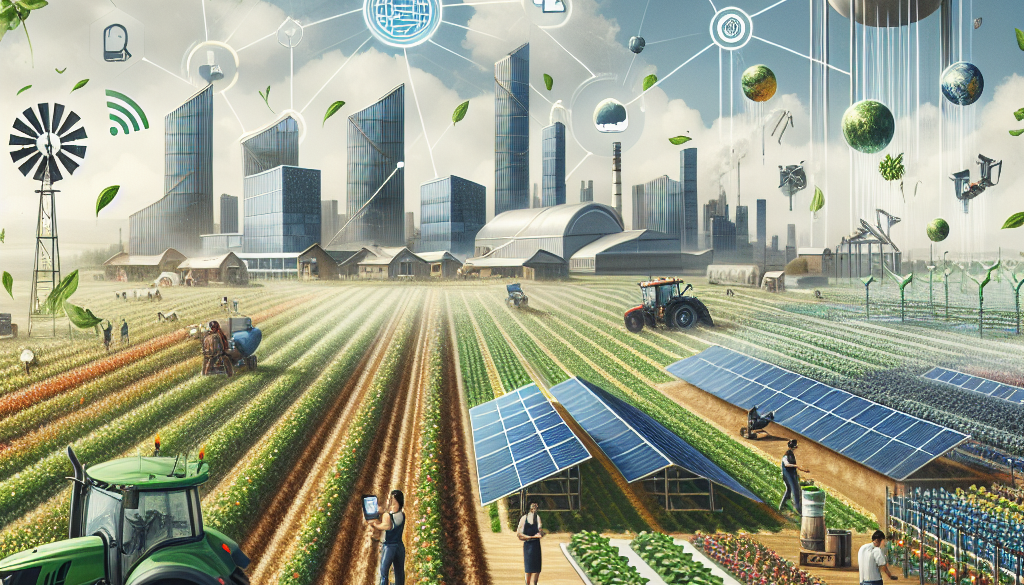Technology’s Role in Making Food Sector More Sustainable
-
Table of Contents
- Technology’s Role in Enhancing Sustainability in the Food Sector
- Advancements in Agricultural Technology
- Food Waste Reduction Through Technology
- Energy Efficiency and Renewable Energy in Food Production
- Consumer Engagement and Education Through Tech
- Challenges and Future Prospects
- Conclusion
- ETprotein’s Contribution to Sustainable Food Solutions
Technology’s Role in Enhancing Sustainability in the Food Sector
The food sector is a critical component of the global economy, but it also poses significant environmental challenges. With the world’s population projected to reach nearly 10 billion by 2050, the demand for food will inevitably increase, putting additional pressure on natural resources. However, technology is playing a pivotal role in transforming the food industry into a more sustainable and efficient system. This article explores how technological innovations are making the food sector more sustainable, from production to distribution and consumption.
Advancements in Agricultural Technology
At the heart of the food sector lies agriculture, where sustainability efforts are paramount. Technological advancements are revolutionizing traditional farming practices, leading to increased efficiency and reduced environmental impact.
- Precision Agriculture: GPS and IoT-enabled devices allow farmers to monitor crop health, soil conditions, and weather patterns. This data-driven approach ensures that resources like water, fertilizers, and pesticides are used optimally, reducing waste and environmental harm.
- Vertical Farming: By growing crops in vertically stacked layers, often in controlled environments, vertical farms use less land and water than traditional agriculture. LED lighting and climate control systems also contribute to higher yields and year-round production.
- Biotechnology: Genetic modification and CRISPR gene editing are controversial but potent tools for developing crops that are more resistant to pests, diseases, and extreme weather, potentially reducing the need for chemical inputs and increasing food security.
Food Waste Reduction Through Technology
Food waste is a significant issue, with approximately one-third of all food produced for human consumption lost or wasted. Technology is tackling this problem from multiple angles.
- Supply Chain Optimization: Advanced software and AI are being used to streamline supply chains, ensuring that food is transported more efficiently, reducing spoilage and waste.
- Smart Packaging: Innovations in packaging, including sensors that monitor freshness, can extend the shelf life of food products and inform consumers and retailers about the quality of the contents.
- Apps for Surplus Food: Mobile applications connect consumers with retailers and restaurants offering discounted food that would otherwise be discarded, ensuring more food is consumed and less is thrown away.
Energy Efficiency and Renewable Energy in Food Production
Energy consumption is a significant aspect of food production, and technology is helping to reduce the carbon footprint associated with it.
- Renewable Energy: Solar panels, wind turbines, and biogas from organic waste are increasingly being used to power agricultural operations, reducing reliance on fossil fuels.
- Energy-Efficient Equipment: From low-energy lighting in greenhouses to energy-saving appliances in food processing, new technologies are cutting energy use across the food sector.
Consumer Engagement and Education Through Tech
Technology also empowers consumers to make more sustainable food choices.
- Traceability and Transparency: Blockchain and other traceability systems allow consumers to track the journey of their food from farm to fork, promoting transparency and encouraging sustainable purchasing decisions.
- Educational Platforms: Online resources and apps provide information on sustainable diets, food storage, and waste reduction, helping consumers to adopt more eco-friendly habits.
Challenges and Future Prospects
While technology offers many solutions, it also presents challenges such as high costs, accessibility issues, and the need for skilled labor. However, as technology becomes more advanced and widespread, these barriers are likely to diminish, paving the way for a more sustainable food sector.
Conclusion
Technology is a driving force in making the food sector more sustainable. From precision agriculture to smart packaging and renewable energy, innovations are reducing the environmental impact of food production, distribution, and consumption. As the world moves towards a more sustainable future, the role of technology in the food sector will only become more critical.
ETprotein’s Contribution to Sustainable Food Solutions
ETprotein is at the forefront of providing sustainable protein options that cater to the growing demand for environmentally friendly food products. Their range of organic bulk vegan proteins, including rice, pea, and various seed proteins, are non-GMO and allergen-free, making them an excellent choice for consumers looking for sustainable and healthy alternatives. ETprotein’s commitment to quality and sustainability makes them a valuable partner in the global effort to create a more sustainable food sector.
About ETprotein:
ETprotein, a reputable protein and L-(+)-Ergothioneine (EGT) Chinese factory manufacturer and supplier, is renowned for producing, stocking, exporting, and delivering the highest quality organic bulk vegan proteins and L-(+)-Ergothioneine. They include Organic rice protein, clear rice protein, pea protein, clear pea protein, watermelon seed protein, pumpkin seed protein, sunflower seed protein, mung bean protein, peanut protein, and L-(+)-Ergothioneine EGT Pharmaceutical grade, L-(+)-Ergothioneine EGT food grade, L-(+)-Ergothioneine EGT cosmetic grade, L-(+)-Ergothioneine EGT reference grade and L-(+)-Ergothioneine EGT standard. Their offerings, characterized by a neutral taste, non-GMO, allergen-free attributes, with L-(+)-Ergothioneine purity over 98%, 99%, cater to a diverse range of industries. They serve nutraceutical, pharmaceutical, cosmeceutical, veterinary, as well as food and beverage finished product distributors, traders, and manufacturers across Europe, USA, Canada, Australia, Thailand, Japan, Korea, Brazil, and Chile, among others.
ETprotein specialization includes exporting and delivering tailor-made protein powder and finished nutritional supplements. Their extensive product range covers sectors like Food and Beverage, Sports Nutrition, Weight Management, Dietary Supplements, Health and Wellness Products, and Infant Formula, ensuring comprehensive solutions to meet all your protein needs.
As a trusted company by leading global food and beverage brands and Fortune 500 companies, ETprotein reinforces China’s reputation in the global arena. For more information or to sample their products, please contact them and email sales(at)ETprotein.com today.












